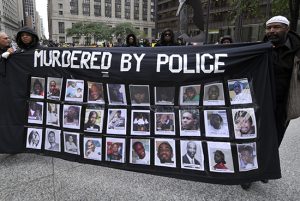(ThyBlackMan.com) Are Blacks intentional targets of police brutality? Whites say no. However, African-Americans argue, of course, they are! And point out; does the name Philando Castile ring a bell?
As racial unrest continues, the barbaric behavior of law enforcement officials, long feared by civil rights leaders, is now a reality. Thus; guns, tasers, and chokeholds have become weapons of devastation in cities across the U.S. Case in point: The death of Philando Castile, a 32-year-old Black man shot and killed by Minnesota police officer Jeronimo Yanez in 2016. In addition to losing his life, Castile’s murder was broadcast live on Facebook.
Jeronimo Yanez in 2016. In addition to losing his life, Castile’s murder was broadcast live on Facebook.
Following the shooting, Yanez was charged with second-degree manslaughter and two counts of dangerous discharge of a firearm. On July 19, 2017, he was acquitted of all charges and terminated by the St. Anthony Police Department. When news of the verdict was made public, Blacks were outraged and called the decision, a blatant display of injustice. As with similar cases, Castile’s death sparked more debate about the mistreatment of African-Americans by individuals who swore to uphold the law.
Reflections From the Past
Since the 1991 Rodney King beating, Blacks have come under the wrath of police, intent on using guns and other devices as weapons of racism. Among the growing number of victims, the names read like a Who’s Who of Human Calamity; like Abner Louima, Tyisha Miller, and Amadou Diallo. Remember them?
To most people the names sound familiar; but, they can’t quite put a face to them. Allow me to refresh your memory, as we recall three horrendous crimes that took place long before Black Lives Matter, became the rallying cry of protest.
Abner Louima
In 1997, Louima, a Haitian immigrant, was assaulted by an officer who rammed a broomstick up his rectum. The crime was as shocking as the location; a restroom in the 70th precinct station house in Brooklyn. The vicious attack led to Louima spending eight weeks in the hospital, where he underwent multiple surgeries. Update: Louima who received an $8.75 million payout from the city, now lives in Miami Lakes, Florida, where he invests in real estate.
Tyisha Miller
On December 28, 1998, police shot 19-year-old Tyisha Miller of Riverside, California, as she sat unconscious in her aunt’s car at a gas station. In the bloody melee, police fired 23 shots, 12 of which hit Miller. She was shot four times in the head, and once in the chest. In their defense, the police claimed they heard a shot and saw Miller’s hand move toward a gun.
Update: In 2000, Riverside’s insurance carrier agreed to pay the family of Tyisha Miller $3 million to settle a wrongful death lawsuit.
2018: In January, “My Name is Myeisha” a film based on Miller’s life premiered at the *Slamdance Film Festival in Park City, Utah. The movie starring newcomer Rhaechyl Walker was written by director Gus Kreiger and Rickerby Hinds, a playwright professor at UC Riverside. The film is based on Hinds’ play “Dreamscape“. When asked why he wanted to do the movie, Hinds said, “I wanted to explore the life of a fellow human being who is no longer with us. Whether what happened was justified or not, this person had faults, dreams and all of those things we all have.”
Amadou Diallo
Like Miller, Amadou Diallo met a similar fate. Born in Guinea, West Africa, Diallo, who had no criminal record was shot outside his Bronx apartment on February 4, 1999. According to reports, four White police officers fired 41 shots at the 22-year-old street vendor, striking him 19 times. The reason for the murder? They mistakenly identified Diallo as a serial rapist from a year earlier.
In the aftermath of realizing they shot the wrong man, there was no remorse from the officers and no apology to the family.
Update: In March 2004, Diallo’s parents filed a $60 million suit against the city, and was ultimately awarded $3 million. The officers were charged with wrongful death, gross negligence, and other violations.
In the cases above, all the officers were acquitted, with the exception of Justin Volpe, who pled guilty to sodomizing Abner Louima. He is currently serving 30 years at the Butner Federal Correctional Institute in North Carolina and is scheduled for release on August 3, 2025.
When incidents of this nature occur, counteraction is taken, and everyone assures the victim’s family the officer (s) will not go unpunished. Unfortunately, it doesn’t turn out that way. Americans interested in reducing excess force by police, should lobby their elected officials to make unwarranted abuse of any suspect (guilty or innocent) a criminal offense. Only then will police brutality become less common.
In specifying the miscarriage of justice regarding Castile, Louima, Miller, and Diallo. This conveys two messages to African-Americans. They are more likely to be targeted by law enforcement officers than other races. And law and fairness go together, like cheap Vienna sausages and a vintage bottle of Roederer Cristal champagne! Now, that is a comparison that needs no confirmation or outrageous excuse.
Notes:
*For movie buffs familiar with festivals, the Slamdance Film Festival, should not be confused with the Sundance Film Festival founded by actor and director Robert Redford.
Staff Writer; Peggy S. Butler
One may also view more of this talented writer work over at; http://peggysbutler.com. Also feel free to connect via Twitter; http://twitter.com/peggybutler647.

















As a former detective and African American father and activist I have written extensively on how to stop police brutality and how to end it all together one officer at a time. It is still worse than you think.
http://www.killedbypolice.net
http://www.policemisconduct.net
If you would like to help end police brutality, email me at atlantacrimecommission@yahoo.com and I will share many ways you can make a difference.